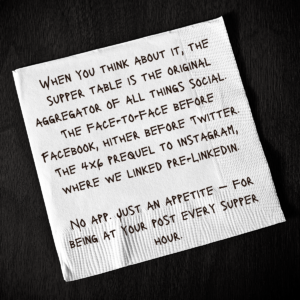
When the kids were growing up, my favourite time of day was suppertime. You could always count on it rolling in as the sun bowed out. If you missed it, you did so voluntarily. Because making time for supper is a conscious choice.
Surprisingly, suppertime is a relatively modern-world concept. Families only began eating together in the evening in the 18th century, after the Industrial Revolution stripped midday of its traditional role as the communal mealtime of choice. As factory work outside the home gathered steam, church and farm bells summoning families from the fields for lunch grizzled to a halting hush. The evening unavoidably became the only time of day to gather all together for a meal.
But continue to gather all together for a meal we did, and for the next two hundred years no less.
Until the paradigms of work shifted once again, except this time, in deference to a more “flexible” lifestyle that systematically ate away at family mealtimes, filling kitchen chairs sadly took a backseat to new priorities.
Growing up, such was the value of supping together as a family that whenever I was sick and bedridden, my parents would join me for supper in my room, plates on their laps. On Thursday and Friday evenings, when my father-in-law closed his tailor shop at 9, the family would wait until he arrived home before sitting down to supper.
So lifestyle? Or life choice?
As our own children were growing up, the kitchen table was the rallying point where we planted our flag at the end of the day and staked our claim over what we had the power to control.
The food was but the carrot. Bread was broken, glasses were raised, every familiar ritual a notch on the key that unlocked the day’s events and plated the most substantial course before us: conversation.
Granted, not everyone works 9 to 5. But for many of us, supper “time“ can be forgivingly fluid. Mostly everyone retreats to the mothership at the end of the day. And you can depend on suppertime showing up every day.
Suppertime asks for nothing in return but faith in its inexorable reoccurrence. All we need to do is fill a kitchen chair and pass the day’s events around the table.